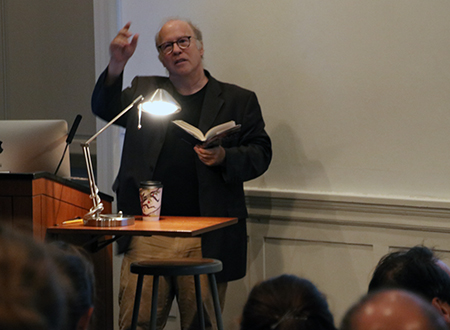12/13/2017
By Vaheed Ramazani, Professor of French, Kathryn B. Gore Chair of French Studies

On Friday, November 17, in Stone Auditorium, Mark Danner delivered a talk titled “Making America Great: Nationalism, Terror and Forever War.” Danner is James Clarke Chace Professor of Foreign Affairs and the Humanities at Bard College and Chancellor’s Professor of Journalism, English, and Politics at the University of California, Berkeley. The talk, which was sponsored by the Kathryn B. Gore Chair in French Studies, focused on President Trump’s drastic reduction of the U.S. diplomatic corps and his tendency to monopolize the conduct of American foreign policy. According to Danner, the “war on terror” is considerably more aggressive under Trump than it was under President Obama, with American drones, bombers, and Special Operations forces now ratcheting up the violence in numerous countries around the world, including Afghanistan, Pakistan, Iraq, Somalia, Syria, and Yemen. The United States’ increasing belligerence abroad, which also displays a sharply diminished regard for civilian casualties, has radicalized indigenous populations, assisting extremist groups in the recruitment of insurgents and accelerating the globalization of terrorism that began with the U.S. invasion of Iraq in 2003.
Danner observed that Trump’s bellicose stance toward Iran and his unconditional embrace of the new Saudi regime’s consolidation of power threaten to destabilize the Middle East by fanning the flames of a proxy war (a conflict being played out in Lebanon, Iraq, Syria, and Yemen) between Saudi Arabia, Israel, and the U.S. on the one hand and Iran and Hezbollah on the other.
At the same time, the United States’ traditional allies in Europe and Asia are less and less inclined to see the U.S. as a reliable partner. Trump’s de-certification of the nuclear agreement with Iran, his withdrawal from the Paris climate accords and from the Trans-Pacific Partnership, and his threat to “renegotiate” the North American Free Trade Agreement all undermine U.S. credibility. The resultant geopolitical uncertainty incites other countries to seek to protect themselves by adopting increasingly nationalistic governments and ideologies.
Professor Danner’s talk was attended by a large and highly engaged audience consisting of faculty and students representing a variety of disciplines, including English, French and Italian, Political Science, and International Relations. The question-and-answer period, which lasted for over forty minutes, touched on issues such as sovereignty and the projection of power, Russia’s influence on the presidential election, and the future of the United States’ relations with its allies.

